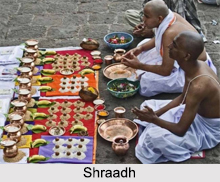 Shraadh is a ritualistic custom unique to the Hindu religion observed after the `Antyesthi` or death ceremony. It is a ceremony to offer prayers of loving homage to the departed and to remember his/ her memories. This ceremony is generally performed at home. The relatives and friends are invited to join the rituals and later they are served a meal. The son or heir of the deceased also performs the Shraadh annually.
Shraadh is a ritualistic custom unique to the Hindu religion observed after the `Antyesthi` or death ceremony. It is a ceremony to offer prayers of loving homage to the departed and to remember his/ her memories. This ceremony is generally performed at home. The relatives and friends are invited to join the rituals and later they are served a meal. The son or heir of the deceased also performs the Shraadh annually.
Hindu Shastras mention that Shraadh karmas should be done for at least 3 generations which include father, grandfather and great grandfather; and the other family members in their generations. Whichever of the family members are dead in these generations, Shraadh can be done for them, but it is compulsory to do Shraadh for father, grandfather, great grandfather and respective wives of all three of them, whichever of them are dead.
Significance of Shraadh
The ancient Hindu scriptures like the Vedas and Puranas like Agni Purana, Garuda Purana, Vayu Purana, etc. explain the significance of Shraadh. Hindus believe that after death the soul or `Atma` leaves the physical body or `Sthula Sarira` with a vehicle called `Linga Sarira` or subtle body, sometimes referred as `Angushtha Matra`. This soul or Preta is consequently in a restless, uncomfortable plight and is considered as impure until and unless the first shraadh is performed.
To satisfy the deceased soul, the Shraadh ritual is done on certain day after death and it is performed again at the end of the month and end of the year. The heirs also perform `Tarpan`; thus they invite their ancestor soul to take part in the pilgrimage with them and share their bliss.
Performance of Shraadh
Shraadh is performed on 10th, 13th, 15th, 20th or 30th day after death. The day chosen entirely depends on the custom of that community. During the Shraadh, food and water is offered to the departed soul. This is known as `Pinda`. The priest utters sacred hymns. According to the rituals, the visitors who attend the Shraadh must not wear bright coloured clothing. There should be an absolute silence even when offering condolence. Although it is a sad occasion crying is not allowed as crying is considered as a disturbance. During offering condolence one can touch the hand of the members of the deceased person"s family if they are of same sex. If donations are given they must not be handed directly to the immediate member of the grieving family but can be handed through other relatives.
The Shraadh is also done on annual basis in the death anniversary following the Hindu calendar. Shraadh on the day of Mahalaya is done in a fortnight called `Pitri Paksha`. During this fortnight, in the memory of the loved bygones their favourite food is eaten and the good time passed with them is remembered. The family members pray that their soul rest in eternal peace.









